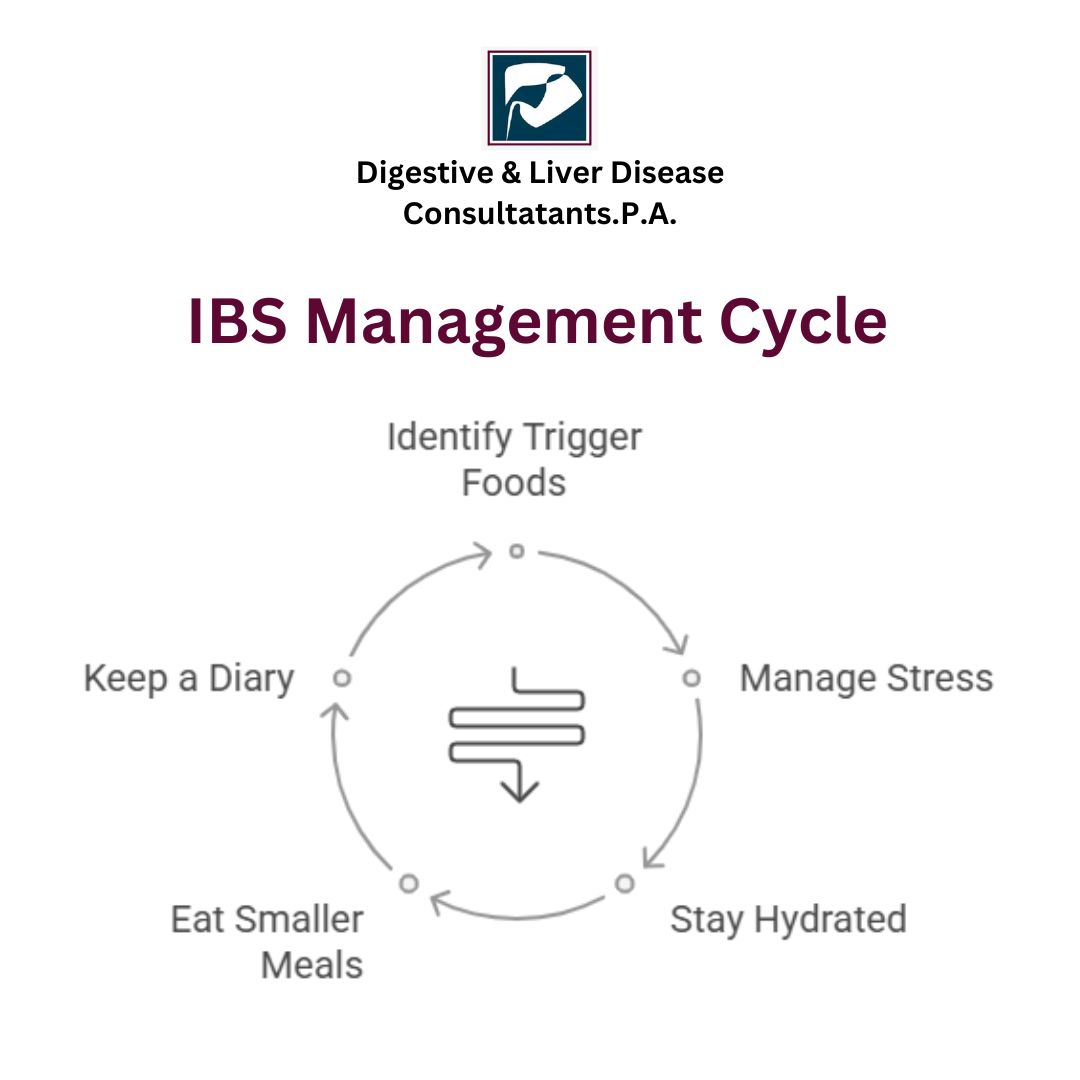Living with Irritable Bowel Syndrome (IBS) can be a daily challenge. This common digestive condition affects millions of people worldwide, causing uncomfortable symptoms like abdominal pain, bloating, diarrhea, and constipation. While IBS is not life-threatening, it can significantly affect your quality of life, making simple activities like eating out, travelling, or working more difficult.
At Digestive & Liver Disease Consultants, P.A., we understand the challenges people with IBS face and are committed to helping patients find relief and manage their symptoms effectively. In this blog, we’ll explain what IBS is, its symptoms, and possible causes, and we will share simple, practical tips to help you live better with IBS.
What is Irritable Bowel Syndrome (IBS)?
Irritable Bowel Syndrome is a functional disorder of the digestive system. This means there’s no visible damage to the intestines, but the way they work is disrupted. IBS affects how your brain and gut work together, causing changes in bowel movements and abdominal discomfort.
IBS is a chronic condition, which means it can last for months or even years. While it can be frustrating, the good news is that with the right lifestyle changes and care, you can manage your symptoms and lead a normal, active life.

Common Symptoms of IBS
IBS symptoms can vary from person to person, and they often come and go. The most common symptoms include:
- Abdominal pain or cramping
- Bloating and gas
- Diarrhea, constipation, or both
- Changes in the appearance of stool (loose, hard, or lumpy)
- A feeling of incomplete bowel movements
Some people notice that stress, certain foods, or hormonal changes trigger their IBS symptoms.
What Causes IBS?
The exact cause of IBS is still unknown, but several factors may play a role, such as:
- Abnormal muscle contractions in the intestine that move food too quickly or too slowly.
- Oversensitive nerves in the gut that react more strongly to digestion.
- Imbalances in gut bacteria can sometimes follow an infection or illness.
- Stress or anxiety, which can worsen digestive symptoms.
- Food sensitivities, where certain foods trigger discomfort.
IBS is more common in people under 50, women, and those with a family history of digestive problems.
Tips for Managing IBS and Finding Relief
If you have IBS, small changes in your daily habits can make a big difference in how you feel. Here are some practical tips to help ease your symptoms:
1. Identify and Avoid Trigger Foods
Certain foods can worsen IBS symptoms. Keep a food diary to track what you eat and how it affects you. Common trigger foods include:
- Dairy products
- Fried and fatty foods
- Caffeine (coffee, tea, sodas)
- Alcohol
- Beans and lentils
- Artificial sweeteners (sorbitol, xylitol)
- Certain vegetables (onions, cabbage, broccoli)
Once you identify your triggers, limit or avoid them to reduce flare-ups.
2. Eat Smaller, More Frequent Meals
Large meals can overwhelm your digestive system and lead to cramping or bloating. Try eating smaller portions more frequently throughout the day. This can help ease digestion and keep symptoms under control.
3. Add More Fibre (But Slowly)
Fibre helps with constipation by softening stools and making them easier to pass. However, increasing fibre too quickly can cause gas and bloating. Gradually add fibre-rich foods like oats, brown rice, fruits, and vegetables to your diet.
For people with diarrhea-predominant IBS, soluble fibre (found in oats, apples, bananas, and carrots) is often easier to tolerate.
4. Stay Hydrated
Drinking enough water is essential for good digestion. Aim for at least 6-8 glasses of water a day. Avoid sugary drinks, excessive caffeine, and alcohol, which can irritate your stomach.
5. Manage Stress
Stress is a well-known trigger for IBS. Finding healthy ways to relax can help manage symptoms. Try activities like:
- Yoga or gentle stretching
- Deep breathing exercises
- Meditation
- Listening to music
- Regular walks or light exercise
Even a few minutes of daily relaxation can have a positive effect on your digestive system.
6. Be Cautious with Medications
Some medications, including antibiotics, antidepressants, and pain relievers, can upset your stomach or change your bowel habits. Always check with your doctor about the side effects of any medications you take, and never stop or change medications without medical advice.
7. Try Probiotics
Probiotics are “good bacteria” that can help balance the bacteria in your gut. Some people with IBS find that probiotic supplements or foods like yoghurt and kefir help reduce symptoms like bloating and irregular bowel movements.
8. Regular Exercise
Physical activity helps stimulate digestion and can reduce stress, both of which are beneficial for IBS. Aim for at least 30 minutes of moderate exercise most days of the week. Even a simple walk after meals can aid digestion and improve symptoms.
When to See a Digestive Specialist
While IBS is not a life-threatening condition, it can significantly disrupt your daily life. If you notice persistent digestive symptoms, unexplained weight loss, or blood in your stool, it’s important to seek medical attention to rule out other conditions.
At Digestive & Liver Disease Consultants, P.A., our experienced team of board-certified gastroenterologists specializes in diagnosing and managing conditions like IBS, Crohn’s disease, ulcerative colitis, liver diseases, and more. We offer advanced diagnostic tests and customized treatment plans to help you find relief and regain control of your health.
About Digestive & Liver Disease Consultants, P.A.
Digestive & Liver Disease Consultants, P.A. is a leading gastroenterology practice providing comprehensive care for patients with digestive and liver disorders. With a commitment to compassionate, patient-centred care, our skilled specialists use the latest technologies and treatments to address a wide range of gastrointestinal concerns.
Whether you’re dealing with chronic digestive symptoms, liver problems, or need routine screenings, our team is here to support you with expert care in a comfortable environment.
Conclusion
Living with Irritable Bowel Syndrome can be challenging, but it doesn’t have to control your life. With the right lifestyle adjustments, stress management, and professional care, you can manage your symptoms and improve your quality of life.
If you’re struggling with IBS or ongoing digestive problems, don’t wait to get help. Schedule an appointment with the experts at Digestive & Liver Disease Consultants, P.A. today. Our team is dedicated to helping you feel better, eat with confidence, and enjoy life again.






